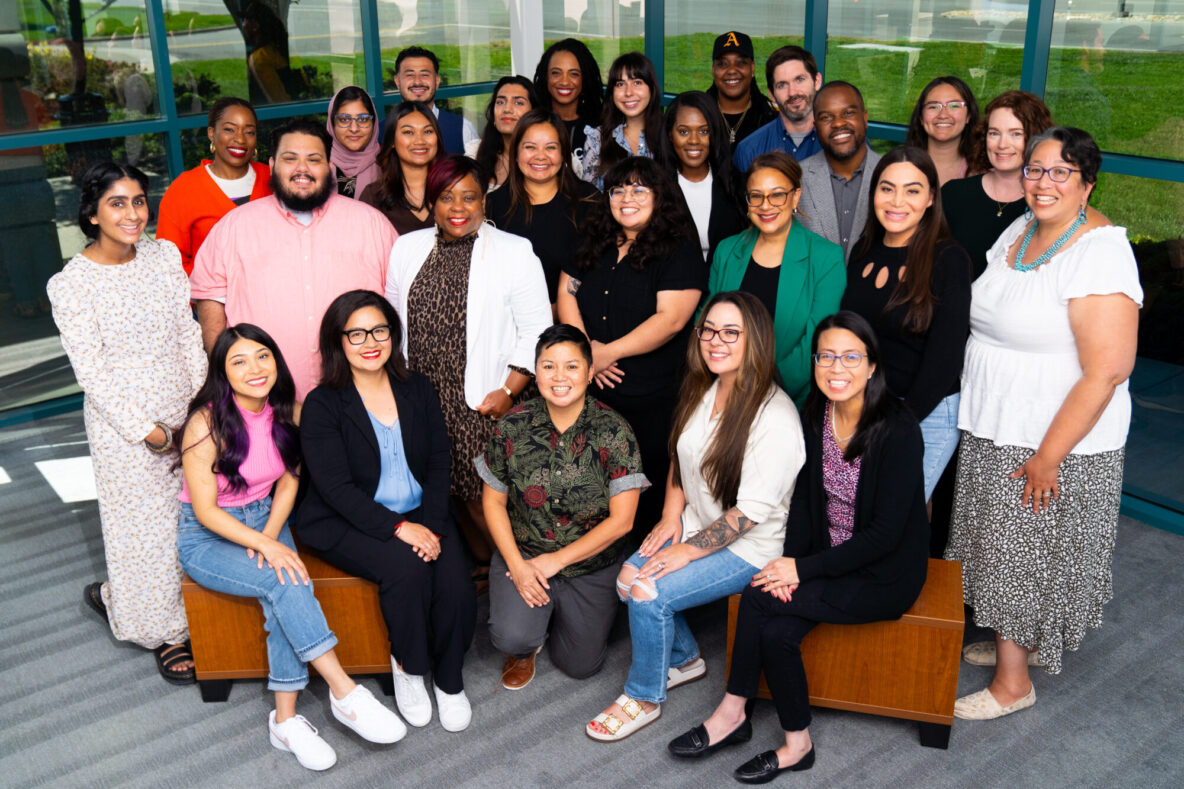
Rise Up Leaders in California are hard at work addressing critical gender equity issues in their communities. Following the Rise Up Leadership & Advocacy Accelerator last year, California leaders applied for $60,000 in grant funding to tackle complex education, health care, and economic challenges with innovative, people-centered advocacy approaches. A total of seven advocacy projects were selected for funding that reflect the diversity of both Rise Up Leaders and their areas of focus, including housing equity, transgender rights, Black maternal health, criminal justice reform, forced marriage, and school safety.
We are proud to spotlight the following leaders who received Rise Up funding for their advocacy work to strengthen gender equity and justice in California.
University Housing Equity Initiative: David Carranza and Cre8Innovations have identified housing insecurity as a significant barrier faced by marginalized communities at the University of California, Berkeley. David and Cre8Innovations are seeking to establish a model that provides comprehensive support services and a budget for safe, accessible housing for formerly incarcerated and former foster youth students across University of California colleges.
Committing to the Success of Black Transgender Students in California Community: Tasha Henneman and PRC aim to enhance the effectiveness of the City College of San Francisco’s gender diversity and inclusion policy by creating a comprehensive guidebook to assist transgender students, with a particular focus on transgender students of color, in reporting grievances related to adversity encountered while pursuing educational goals and raising awareness about the policy.
Freedom to Choose: Sadia Khan and the Family Violence Law Center found that existing legislation falls short in fully safeguarding those at risk of forced marriage (California reported 23,588 forced marriages between 2000-2018) and providing comprehensive solutions for survivors trying to escape harmful situations. As a result, Sadia and her organization will collaborate with coalition partners to conduct in-depth research and gather data on the health, safety, and financial challenges of forced marriages in California to inform lawmakers for more effective policy making.
Transgender Wellness and Equity Fund State Budget Advocacy: Khloe Rios-Wyatt and Alianza Translatinx are committed to enhancing the quality of life for all Transgender, Gender Diverse, and Intersex (TGI) communities through policy advocacy. Khloe and Alianza Translatinx plan to ensure the sustainability of California’s Transgender Wellness and Equity Fund (TGIWEF) as a lasting source of funding for TGI individuals by securing ongoing, permanent funding of $23 million annually for the TGIWEF (AB 2218) during the 2025-2027 budget cycle.
Achieving Health Equity for Black Birthing People in California: Eva Rivera and The Children’s Partnership are working to enhance access to essential prenatal care, birthing/parenting support, and postpartum care for Black birthing people and their families. Eva and TCP’s strategy includes advocating for new benefits for a community workforce, including doulas and community health workers, through California’s Medicaid program, establishing birth centers in Black communities, and strengthening public programs that are vital for Black birthing people.
Improving School Environments by Increasing Bathroom Access: Araiye (Ray) Thomas-Haysbert and Youth Forward want to address the critical issue of equitable bathroom access in the Sacramento City Unified School District. Ray and Youth Forward plan to organize students to advocate for changes in bathroom access policies, starting with one high school and leveraging this success to achieve a district-wide restroom policy that prioritizes the physical and mental health of all students, with a focus on girls, young women, nonbinary students, and LGBTQ students.
Justice for Survivors — End the Felony Murder Rule: Daniel Trautfield and the Felony Murder Elimination project will establish a working group dedicated to reforming laws that disproportionately punish domestic violence survivors and to re-sentence those who have been unjustly incarcerated. The working group’s key objectives include creating an online platform that highlights the urgent need to address the criminalization of survival through intimate stories and testimonials of women who have endured violence and imprisonment.


